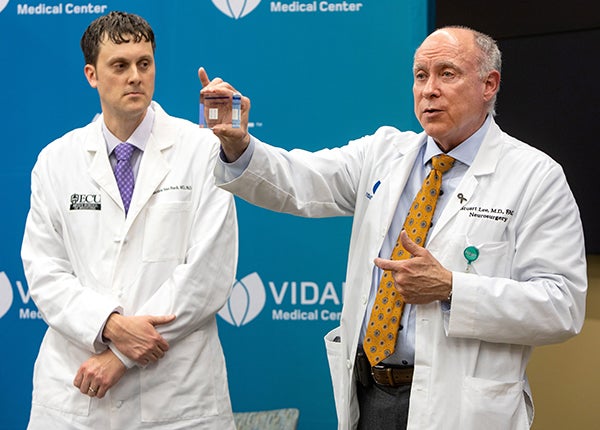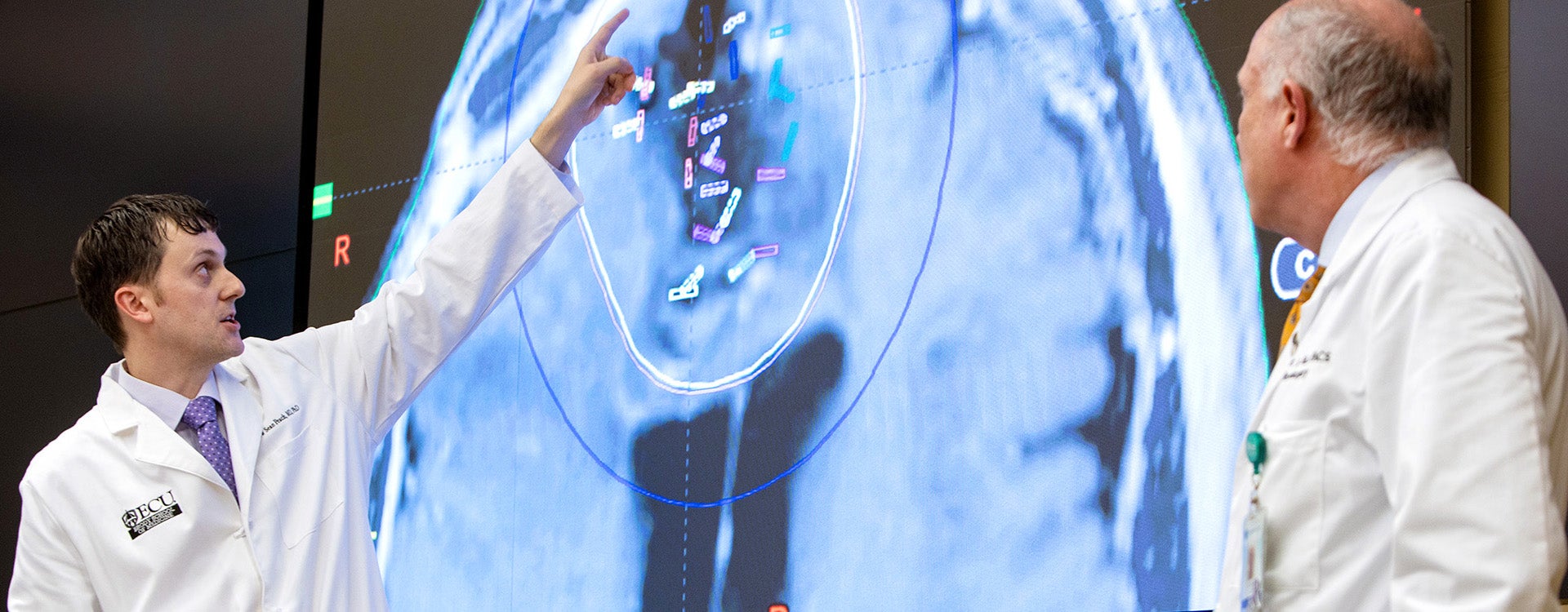TREATING BRAIN TUMORS
ECU, Vidant doctors first in N.C. to treat brain tumors with new radiation procedure
Doctors at East Carolina University’s Brody School of Medicine and Vidant Medical Center were the first in North Carolina to perform a new radiation therapy procedure that is giving hope to patients with recurrent brain tumors.
Brain tumors are typically treated with surgical removal and then Gamma Knife radiosurgery or external radiation to eliminate residual tumor cells. However, it can often take weeks for the surgical wounds to heal enough for radiation therapy to commence, giving the tumor an opportunity to start growing back before the first radiation treatment can take place.

ECU’s Dr. Matthew Sean Peach, left, and Vidant Health’s Dr. Stuart Lee discuss North Carolina’s first GammaTile procedure taking place at Vidant Medical Center.
GammaTile Therapy is a surgically targeted radiation therapy in which a 3D-collagen tile, embedded with radioactive Cesium-131 rods, is placed in the tumor cavity at the time of surgery. The tile immediately begins delivering targeted radiation treatment to the tumor cells – at a higher dose than traditional external beam radiation. This treatment also results in less radiation exposure to surrounding tissue because the radiation from the GammaTile does not have to travel through healthy parts of the brain to reach the tumor cells.
The procedure is currently only approved by the U.S. Food and Drug Administration (FDA) for patients who have undergone previous procedures, but whose tumors returned.
“These patients often cannot tolerate additional treatment with traditional radiation therapy,” said Dr. Matthew Sean Peach, an assistant professorin Brody’s Department of Radiation Oncology. “This procedure is important for our community because it offers a treatment option for patients who previously wouldn’t have had options. And they don’t need to travel to Raleigh, Texas or New York; they can get cutting-edge medical treatments right here in Greenville.”
The therapy is also ideal for patients who have difficulty making repeated trips to receive radiation treatments because the tile delivers the radiation to the tumor cells over the course of approximately a month. Patients can go about their daily lives without the interference of additional radiation treatments.
“We’re often looking at a minimum of 25 treatments over five to six weeks of radiation. But in eastern North Carolina wehave a lot of farmers, a lot of business owners and a lot of other people in this region for whom being away for that amount of time is just not doable,” Peach said. “In the past, these patients wouldn’t have received a treatment and (their tumor) would eventually progress. Here we have something that, if we have the appropriate patient, we’re able to deliver this and ensure that they’re getting the radiation they need.”
Dr. Stuart Lee, chief of neurosurgery for Vidant Medical Center, said the procedure has shown to be more effective at delaying the regrowth of brain tumors than standard external radiation. This is partly because the tumor can often be treated with a higher dose of radiation at its source, rather than having to limit the dose of radiation in order to avoid damaging other parts of the brain, which is a common concern with external beam radiation.
The ECU and Vidant physicians and care providers performed North Carolina’s first GammaTile procedure in December. At that time, Vidant Medical Center was one of eight locations in the United States offering the procedure.
“Keeping care close to home is an important part of Vidant’s mission to improve the health and well-being of eastern North Carolina. This procedure enables us to meet that goal while providing effective treatment and improving quality of life for those battling brain cancer,” Lee said. “I am incredibly proud of the care team here at Vidant as well as our partners at ECU for their tireless work in making this new treatment a reality in the East.”
Read More:

